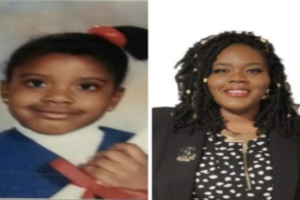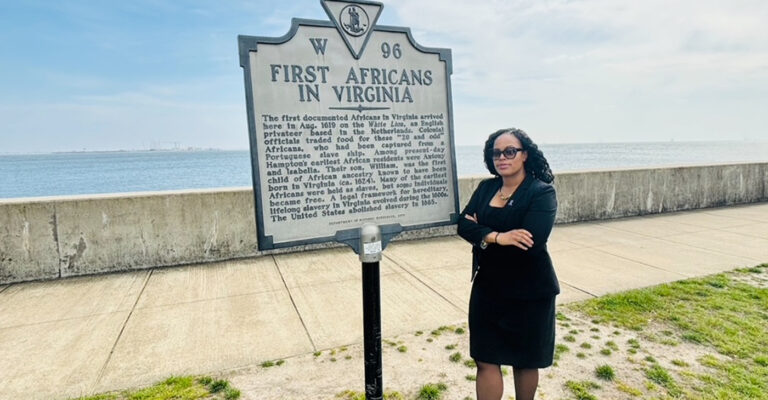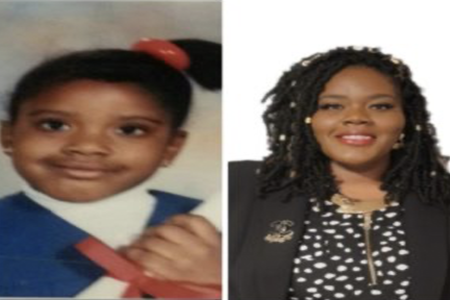Public Welfare Foundation’s Legacies Rooted in Resistance and Resilience Series
By Thena Robinson Mock
Vice President of Programs at Public Welfare Foundation
My grandparents lived just two miles from Old Point Comfort in Hampton, Virginia, a strip of land where the Chesapeake Bay meets the Atlantic. It was there in 1619 that a Dutch ship brought the first group of enslaved Africans to the English colonies, reshaping the course of history and ushering in centuries of racialized slavery and anti-Black racism.
That same site, centuries later, became Fort Monroe, a military post held by the Union Army during the Civil War. The Fort earned a new name over time, Freedom Fortress. It became a place Black people held in captivity risked everything to reach. First a few, and then many, crossing rivers and waterways to seek refuge behind the fortress’ lines.
When I reflect on my family’s history, I think of this American history. In these times, some suggest that we not dwell on the horrors of slavery, as if burying the record might spare us discordant notes. But to turn away from the past is to deny more than America’s inconvenient truths of captivity and cruelty – it is to erase the courage and resilience born of it.
During the summers, my grandmother – a retired schoolteacher – would pile her grandchildren – all girls – into the car for a field trip to Freedom Fortress. We squeezed into the back seat of her gold Oldsmobile Cutlass for the short drive. We were a band of Black girls in coordinated summer sets and hair ribbons, baking beneath the Virginia sun as we posed next to antiquated cannons. My grandmother – always more show than tell – didn’t lecture us about history, but it was clear: she wanted the legacy of Freedom Fortress to embolden our paths, just as it had for her.
My second great-grandfather was among Hampton’s earliest graduates. Born enslaved on a Virginia plantation in 1851, he enrolled at Hampton in 1884 as part of the first pastors’ class. Decades later, between 1930 and 1940, my grandmother and her three sisters would follow in his footsteps, launching them into careers. My mother would graduate in the late 1960s, alongside a host of relatives. I would begin my own journey as a student at Hampton nearly thirty years later. To date, five generations of my family, challenged by the gravity of the times, have returned to Hampton to continue the unfinished business of those who had come before.
Why did we keep returning to Hampton? Maybe it was the same thing those early freedom dreamers sought when they crossed into Freedom’s Fortress – refuge.
When I arrived at Hampton University, I was seeking my own refuge. My mother left Virginia when I was young and relocated my sister and me to a predominantly white Texas suburb. There, my early educational experience was marked by isolation. I was often one of the few Black students, a reality that proved detrimental to my sense of self-worth. At Hampton, I returned to a place that nurtured me, preparing me for a world all too insistent on doing the opposite. At Hampton, which proved no echo chamber, political debates sparked, and my intellect was fed. Ideas collided. It was in this environment that my critical thinking skills were sharpened.
As a student, I spent hours in the University’s archives, uncovering evidence that at every critical juncture in history, Hampton students had been actively engaged in civil and human rights struggles – even challenging the University and questioning the paternalistic intentions of its white founders. On one visit to the archives, I discovered my mother’s signature on a petition. She had protested the unequal curfew rules for men and women. In that moment, the continuum of struggle and resistance felt profoundly personal, a tangible reminder of the interconnectedness of our individual and societal histories. This is not just the history of the Lively family or even of Hampton University; it is the history of America.
Coming up this month, hundreds of families will gather for Hampton University’s annual Homecoming weekend. Hampton’s football field is about so much more than a game, it’s a sacred place for reunions and renewal. Alumni, students, and families will gather to celebrate Hampton’s enduring legacy and the shared pride that binds us together.
For nearly two decades, I’ve dedicated my career to challenging incarceration in America, looking to history for lessons to help guide my steps.
Here is what I believe to be true: I believe that Freedom Fortress and Hampton’s campus were never meant to be final destinations. For me, they represent something more profound: places to be fortified, affirmed, find solidarity, and experience joy. They are spaces where truth and history are acknowledged and shared. Those places are emblematic of the kinds of spaces, communities, and collectives we must continue to build. We need spaces that strengthen our resolve and bolster our courage for the next leg of freedom’s journey now more than ever. As for me, I’m doubling down my efforts to help create – and hold – these spaces. I hope you’ll join me.
Thena Robinson Mock is Public Welfare Foundation’s Vice President of Programs, overseeing the Foundation’s adult criminal justice and youth justice grantmaking strategies. She is a graduate of Loyola University New Orleans College of Law and Hampton University.







